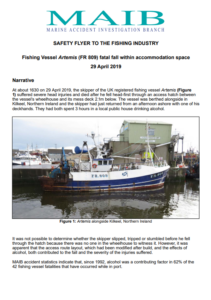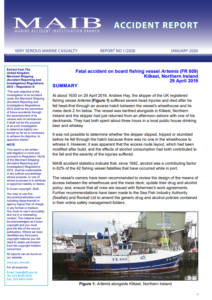In its latest investigation report UK MAIB focuses on a fatal incident concerning a skipper onboard a UK-registered fishing vessel ‘Artemis’ who fell head-first through an access hatch between the vessel’s wheelhouse and its mess deck 2.1m below, resulting to severe head injuries and died. The report notes that a significant factor of the accident was that the skipper was under the influence of alcohol.
The Incident
On April 27 the fishing vessel Artemis, having sailed from Fraserburgh called firefly at at Uig, Skye and loaded a new set of nets. During the passage through the Irish Sea, one of the vessel’s diesel generators failed and, after discussion with the owner, the skipper decided to stop at Kilkeel to conduct a repair.
On April 29 engineering contractors boarded the vessel to repair the generator. When everything was fixed, Artemis’s skipper and engineer went ashore to consult the harbor master about the best time to sail. The harbor master advised the skipper to wait until at least 2½ hours before high water before getting underway, to ensure that he had sufficient height of tide to allow the vessel to safely clear the sand bar in the harbour entrance. Following this advice, the skipper returned to Artemis and informed the crew that the vessel would sail at 1900 that evening.
Following, at 1247 the skipper along with one of his deckhands left the vessel to visit a local public house for a drink; After three hours of drinking whiskey and beer they both headed to the vessel. When they arrived at the ice berth they climbed down the quayside ladder to the fishing vessel’s foredeck. They then proceeded aft, to the wheelhouse.
The deckhand entered the wheelhouse and went to the galley to make a cup of tea, whereas the skipper remained on the upper deck to smoke a cigarette.
According to the report, at about 1630 the deckhand heard a loud noise and as they turned their head to see what was happening, they saw the skipper falling head-first through the wheelhouse hatch and hit the deck below. He immediately went to his aid but could not find any sign of life.
[smlsubform prepend=”GET THE SAFETY4SEA IN YOUR INBOX!” showname=false emailtxt=”” emailholder=”Enter your email address” showsubmit=true submittxt=”Submit” jsthanks=false thankyou=”Thank you for subscribing to our mailing list”]
In light of the accident, the deckhand rushed to the wheelhouse to raise the alarm, calling Kilkeel harbor through VHF radio channel 12. Repeating the calls twice the deckhand received no answer and returned to check on the skipper.
Still unable to find sign of life, he returned to the wheelhouse for a second time and raised the alarm on VHF radio again. This time, his call was answered by another vessel and was relayed to the harbourmaster and emergency services
The Kilkeel harbourmaster rushed straight to Artemis and went on board to examine the casualty. He noted the skipper had suffered a severe head injury and could find no sign of life. Shortly afterwards, the coastguard arrived.
At 1703, an ambulance arrived on the quay and two paramedics boarded Artemis. The skipper was declared deceased at 1705.
Probable causes
- It remains unknown how the skipper fell head-first from the wheelhouse through the mess deck hatch. It is likely that he tripped, stumbled or lost his balance as he approached the unguarded open hatch.
- The access route between the wheelhouse and the mess deck had some post-build modifications, increasing the possibility of someone falling through the mess deck hatch.
- The skipper was under the influence of alcohol and this was almost certainly the most significant factor in this accident.
- The skipper was of duty at the time of the accident but would have been over the mandated alcohol limit at the vessel’s planned time of departure.
- There is a possibility that the skipper did not fully appreciate the amount of alcohol he was consuming or the effect it would have had as the standard measures for spirits in Northern Ireland were 1.4 times those in Scotland.
- The risks of consuming alcohol and then returning to a fishing vessel when moored in harbour appear to be overlooked by many in the industry given that alcohol is a contributory factor in 62% of fatal fishing vessel accidents in port.
Actions Taken
Following the severity of the accident, UK MAIB published a safety flyer to alert all those working in the fishing sector, highlighting the lessons to be learned from this accident.
Specifically, UK MAIB notes that:
While limited alcohol consumption by crew living on board fishing vessels when in port and of duty might be considered acceptable, excessive consumption will severely undermine an individual’s judgement and coordination.
Click to view the safety flyer.
Recommendations
2020/101 BAG FR LLP is recommended to:
- Review the design and layout of the wheelhouse to mess deck hatch and ladder, to reduce the risk of crew falling through to the deck below.
- Update its drug and alcohol policy to ensure its crew are: aware of the legal limits stipulated in the Railways and Transport Safety Act 2003; provided with clear defnitions of when they are on or of duty; and ensure that they are aware of the circumstances under which they may be required to undergo drug and alcohol testing.
- Ensure that it complies with the requirements of the International Labour Organisation 188 and owner’s responsibilities under the Fishing Vessel (Health and safety at work) Regulations and that all crew have fshermen’s work agreements.
2020/102 Seafish and Rockall Ltd are recommended to:
- Review and update the generic drug and alcohol policy in their safety folders to reflect the issues identified by this investigation. These policies should include: the Railways and Transport Safety Act 2003 alcohol limits; a clear definition of when crew are on or of duty; and, parameters under which the skipper or other authorized person may direct a crew member to undergo drug and alcohol testing.
To learn more on the investigation report click herebelow
































































